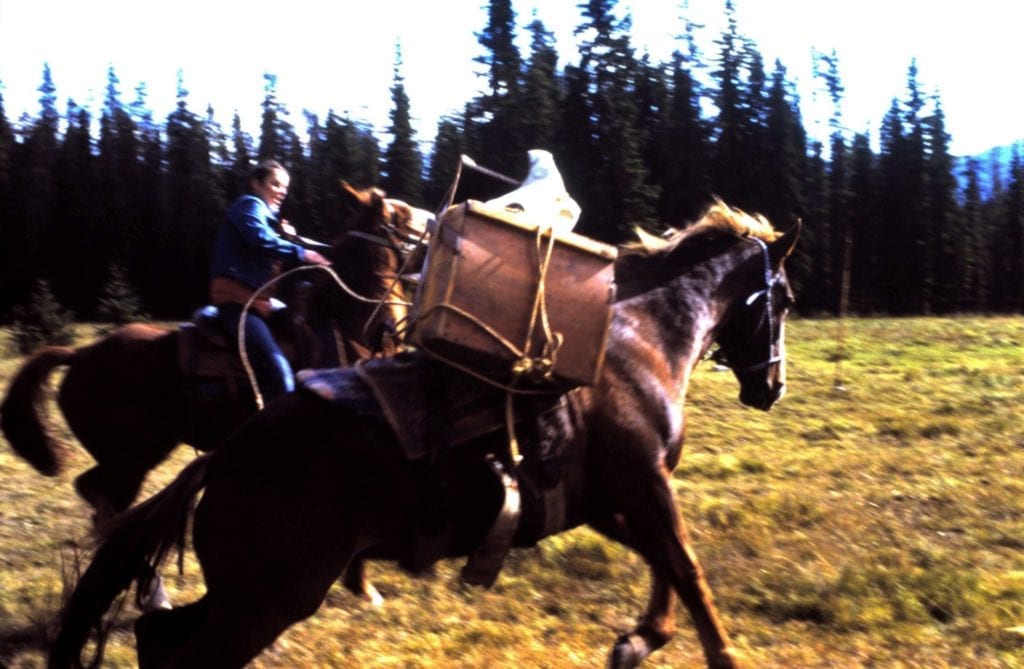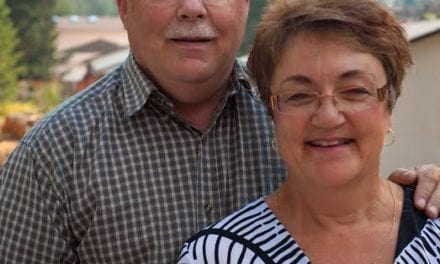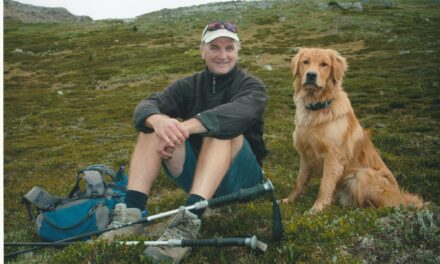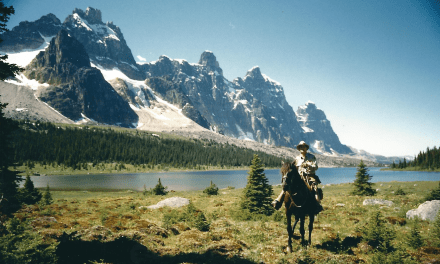(2:41:52) Kathy – Earlier on when they first started the dog program they had a couple of dogs, like Skjonsberg’s dog who didn’t find people. There was a lot of doubt about whether these dogs would work. The search master is sitting there, hanging over you going, “What are you doing?” That is why I felt (the pressure on the training exercise) at the Columbia Ice Fields. There was another guy up there with Maya his dog and she was just wired. She would just run, she ran over everything. She never found anything because she never slowed down. But Bear, I had taken her out and done this CARDA course and all the RCMP are going, “That is not a German Shepherd.” She was a cross between a Lab and a Newfoundland, a beautiful dog, but very quiet. They said, “Well, that is not the right temperament. We need dogs that are going to be good.” German Shepherds are real manly type of dogs and this female dog is so laid back.
(2:43:04) Dale – We called her the valium search dog!
(2:43:06) Kathy – Gerry called her the valium search dog. So I had to go out and do the test. But she was methodical and she just stayed with it. She found all the things that she needed to find and this poor RCMP goes, “She passed.” But when I was on that search…you really do wonder, “Are we working together?” It is quite a demanding thing and it requires a lot of faith.
“I heard about the rescue on Sunwapta where the staff had gone out and the dog looked up and that’s how you found them.”
(2:43:50) Dale – Yeah, the dog saved their lives.) The only reason that we kept going was that the dog had caulked his head and was hearing something that we couldn’t hear.
(2:44:03) Kathy – Look at your horses and look at your dog!
(2:44:07) Dale – That is what made us carry on (at Sunwapta) and 15 minutes later we started hearing these calls for help. But it was very treacherous, that was a very difficult one for the dog because the snow was so slippery and wet. It was all on these big boulders and you couldn’t get any purchase. We had to tie the dog to a tree and leave him to keep going. Fortunately he just laid down and stayed there. He didn’t try and join us. But I think, I think he sensed that it wasn’t a good place for him.
“Where you happy to go to Jasper from Yoho?”
(2:45:50) Kathy – Oh yeah! I love Jasper. We got to stay at the Palisades. We had a big house there and horses there. The first year, I was doing a lot of paperwork, environmental assessments…Then Cyndi Smith, she was the first woman to be given a backcountry district. To go out for your 17 and four or whatever. She had done that the first year that I was there, so I said, “I would like to go and do that too.” It was one of the best (experiences). What an insight into how you have to look after yourself. You’ve got three horses and you have got to kick them out at night and hope that you can find them in the morning. I was with Dave Carnell who was tall. He was always packing up and I was trying to pack up everything and keep up to him, but I’ve got to find a stump and get on my horse at the same time. I was glad to see the last of him! It is kind of interesting to know that we didn’t really have radio coverage. We had single side band, but radio calls were only at 7:30 in the morning and 8:00 at night. You were travelling around all day without any communication. So I would always say, crawling distance, getting close to the cabin! It gives you a huge insight into living by yourself and your own self-reliance. But, I had a wonderful (time)…It was just absolutely beautiful and I had my dog with me. Then there were trying times too when you sort of wonder, “Gee, can I see somebody?” You wouldn’t see anybody for days on end. But, then I remember sitting up on top of a couple of places going, “I am able to look after myself. I feel really good about this.” I had a horse that I brought along and I had a good report on that…I went back the following summer, so I had three years altogether out there (in Willow Creek). This is really being independent now I think.
(2:47:25) The Jasper rodeo was in town and one of the events they started putting in was the warden packing contest…Cyndi and I looked at each other and said, “Why don’t we put in a women’s team?” So we thought, “Yeah, okay let’s try this.” Another girl was there from one of the barns who had a fair amount of not packing (experience) but she could saddle a horse. We got her as a third person. We went down to the range to practice. Denny Welsh was the barn boss at the time. He kind of watched us for a few days. We were really getting nervous, trying to figure out what to do. “How are we going to beat these guys?” Or just do it. So Denny after a couple of days came over and said, “Girls, I am going to give you a couple of tips.” And he showed us a lot of short cuts. He kept working with us and this was very unusual for him. He was not normally that good with stuff, but he was really rooting for us. I remember we were out practicing and all these guys kept sneaking down to the barn. You would see the door open and they were watching us. “What are they doing? Are they actually going to do this?” The day came and we got into the arena. Of course it was just packed with people. We packed the horse up. She got the horse saddled. I had to get help to boost me onto the horse, I was the rider. Off you go. You gallop down to the end…I was riding along pulling this and I am going, “Where is everybody? Where are they?”
“You won?”
Yeah, we won! Hands down, like way ahead of everybody!

Kathy practicing for the packhorse race. Photo courtesy of Don Mickle.
(2:49:28) Dale – Not the final though!
(2:49:29) Kathy – I know! But it was just amazing to have at least done that. Oh, we were chuffed! It made my day. The next day we competed well, but we had some points taken off because some rope wasn’t quite right. Dale won. But those are some really unique experiences I think.
(2:50:23) Kathy – That was about the time that Pat Sheehan died and you were dealing with a lot of car accidents. It seemed there was a lot of drowning accidents.
(2:50:34) Dale – I think I reacted to Pat’s death a lot worse than I normally would. I think it was because all this stuff was just piling up.
(2:50:47) Kathy – They had never done any grief counseling before…at the time the attitude was just suck it up, you know. You just deal with it. You go home and drink a bottle of scotch or something.
(2:51:11) Dale – So they had this grief thing for Pat Sheehan. They brought in this grief counselor and I went to it, thinking, “Well, I will see what it is like.” I just went away from it totally negative because what they had done was brought in everybody together and there was probably 27 of us. We were all in a big circle. We are all talking about this stuff and it wasn’t very personal. I found it really difficult. Sharing experiences with people that I didn’t think I had any relationship with at all and that they weren’t anywhere near where I was as far as coping with all this stuff was concerned. I found it absolutely negative. I talked to a few people afterwards and they all felt the same way. It is not until afterwards that you need to do it and you need to do it on a one to one basis and not in a group thing…It wasn’t very positive…They bring grief counselors in right after an accident happens, like say a shooting at a school. Well that is way too soon, you have to process it.
(2:52:52) Kathy – The person who pioneered that was Kiwi, Lloyd Gallagher. But he did it right. He says, “I am not going to get just anybody up here. Whoever is going to come up and talk to these guys has got to have the same background and they have to know what they are doing.”
(2:53:08) Dale – He started it for K-Country (Kananaskis Country).
(2:53:09) Kathy – Of course he worked really closely with Peter and Willi. He’d say, “Why aren’t you doing this for these guys?” They did it wrong (at first), but they quickly improved after that. They got the idea. They also left out all the wives. They didn’t counsel any of them and a lot of them were very close to Pat.
(2:53:33) Dale – I felt left out of the loop because I had taken time off…I started my year’s absence and did the film stuff and everything else, but we were away when Pat died. So when I got back, I wasn’t working. We were living at the Palisades and I really wasn’t connecting with anybody in the grieving process. I just kind of felt left out. I felt exactly like the wives were feeling. They knew Pat just as well as everybody else did, but they weren’t being part of the process. I can sympathize with where they are coming from with regard to that. I just didn’t have anybody I could talk to…
(2:54:28) Kathy – That was sort of an evolutionary thing with being in the warden service…You just had to be a man. Well actually what a lot of people would do, is they would go to the bar and talk about it. In some ways that worked as well.
(2:54:45) Dale – We used to do that a lot. After a big rescue we would get together over a beer and hash it out.
(2:54:59) Kathy – It was sort of the other way of dealing with it…I was talking to Reg Bunyan and he was on the rescue for all those school kids who were killed. ( In February 2003, seven high school students from Strathcona-Tweedsmuir School were killed in an avalanche in Rogers Pass.). As soon as he got off the rescue they shipped him to Regina for a law enforcement course. He said he was so isolated. He had a really difficult time. He couldn’t talk to anybody he knew. He said, he really noticed it. It was hard you know. That is part of the job. Somehow when you were younger, it didn’t seem (so difficult), but when you get older mortality sets in. It is cumulative I think.
(2:55:45) Dale – Well sure it is. People will say, “Why does this happen?” Well the reason it happens is because things are accumulating. A lot of things are happening both on the job and outside of the job. Those things build up and that is what triggers them all. You get somebody that goes to Afghanistan and has a breakdown well, it is not just because of what happened there, it is also what is happening at his life at home…
(2:56:27) Kathy – At that time I had lost a lot of friends to climbing accidents and helicopter accidents…
When did you retire?”
(2:56:41) Kathy – In 1999, I guess. But the backcountry experience was a highlight, definitely. It still is a major part of our lives. So that is what is hard now. To see all those things that were so wonderful gone.
(2:57:05) Dale – It is hard. We are going to do a horse trip this summer, go into the Stoney Creek, Dormer, Panther all that area there in Banff. It is going to be hard to ride by those warden cabins. Some of them are going to look pretty bleak and neglected.
(2:57:25) Kathy – No trails.
(2:57:46)
“Is there anything about the warden service as you knew it that you would want future generations to know?
Kathy – There are and this is part of it. Sylvia tells me that a lot of the wardens she’s working with, the younger ones, they do know the stories and they’ve heard what it is like. They are very envious of the time that we had there. She said they are good people. They really want to do that sort of thing. It is probably harder for them because they know that was something we could do. I mean…Donny Mickle and Rick Ralf decided to trail the horses back to the Ya Ha Tinda from Yoho. They trucked them up to Jasper and trailed them from there. You couldn’t do that (now). I mean the freedom we had…
(2:58:37) Dale – You had a job that allowed you to do a whole bunch of different things. It was just unbelievably rich and such a great opportunity. It wasn’t a job, it was a life, a lifestyle. It wasn’t about the money, it was about the backcountry and the rescues and just feeling good about what you were doing.
(2:59:06) Kathy – I mean if you wanted to on a certain day, if you weren’t duty warden you could take out a canoe and go canoeing. You could say, “Oh, I am not duty warden, I think I will go check out the trail or go ride over here, or hike up here, or try to get in on this climb.” Get on the climbing schools, the climbing schools were something. I don’t even think they have those anymore. Well, they must. They must have individual training. Sylvia says, “Don’t put them down.” But they have never lived it. In terms of anybody outside (the service)… I don’t think that you could ever explain it to them. They can listen to your stories, but they will think “Hmmm.” I remember one time when we were living in Bowness and I had my saddle on the lawn because I was going to go on a trip with Sylvia into Smokey. This guy, the next door neighbor, came out and he said, “Where are you going?” I said, “I am going on a trip for a couple of weeks with my sister.” And he said, “Just the two of you?” I said, “I used to do this by myself.” It is like apple and oranges. If you have never eaten an apple you will never know what an apple tastes like. You couldn’t begin to explain it to anybody. If you tried to tell your neighbor over here, they wouldn’t know what you are talking about.
(3:00:31) Dale – Well, that is what I really noticed when we moved to Calgary. I was so used to associating with people that know what I am talking about, as far as being involved in the mountains and things like that are concerned. Your next door neighbor in Jasper, or your next door neighbor in Canmore can relate to you in a certain way. People in Calgary, your next door neighbor, they haven’t got a clue you know and you really noticed that.
(3:00:59) Kathy – The other thing too is that we did it so often and we did it with people who were doing the same thing, that it didn’t seem extra ordinary. It was a normal part of your life. It is actually not a normal part of anybody’s life.
(3:01:15) Dale – That is what I missed the most when we left was not being able to on a day to day basis have people around you that you could relate to.
(3:01:25) Kathy – But it is pretty good here.
(3:01:27) Dale – Cochrane is much better, it is a smaller town, but it is not like Canmore though…In Canmore everyone is even more into the mountains.
(3:01:45) Kathy – But our friends here are quite aware, they participated with us in a lot of things. We took them into the backcountry.
(3:01:52) Dale – They got to go to warden cabins you know. That was a highlight.
(3:01:58) Kathy – They miss it!
(3:02:22) Dale – Well, I will tell you one thing. It all changed in the early 1990s when Sandra Davis came. It was like a virus was injected into the bloodstream of the warden service and it altered it from that point on. It was like a viral infection. Just a slow thing, but it took hold and it has been downhill ever since. Everybody says, “Oh well, it is going to turn around.” But it is not going to turn around.
(3:02:49) Kathy – You don’t have the skills. It is sort of like a piece of technology. If you lose a certain chunk, maybe you will never regain it.
(3:02:55) Dale – That is right. So the people who come on cannot relate to what it was like. There is that disconnect and that is what is going to happen. People aren’t even going to have a clue about what it could really be like.
(3:03:10) Kathy – I think right now they want us to come back and start working with some of these people. They have asked us, but it is already kind of late.
(3:03:16) Dale – Well, they do that, but then they don’t have the means of being able to deal with the volunteer part of the whole thing and the liabilities and all of that stuff.
(3:03:25) Kathy – Well, Scotty was saying that they asked him and Mickle if they would come out and train some of these guys, the new kids.
(3:03:30) Dale – But I don’t think Donny and Scotty really have the heart to do that you know.
(3:03:39) Kathy – They have gutted the thing so badly. Maybe three years ago I would have said sure, but the last three years have been dynamically, exponentially out of control.
(3:03:53) Dale – The 1970s and the 1980s were the great years of the warden service and I guess the generation ahead of us, the Joe Halstenson’s would say it was the 1950s and 1960s.
(3:04:04) Kathy – Well even Sylvia. Sylvia was around long enough. I started taking her out when she was 12 or 13 years old, maybe she was 14 when I took her on her first backcountry trip and of course we went climbing. She had a really good insight into what was there. Now she is having to live with what is left.
(3:04:21) Dale – Look at the young people coming up now. They don’t have the opportunities that we had. The world economy seems to be tanking, their opportunities seem to be really limited.
(3:04:32) Kathy – I just got this email. Whatever is left of the Parks is going to rapidly disappear. They’ve cut out 60% of the personnel. Who is looking after the Parks? They keep making national parks for what?
(3:04:50) Dale – Who is on first?



